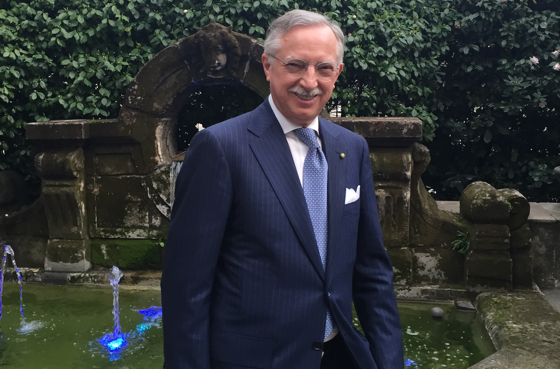What is the magic of Italy, and how has Milan’s current World Expo attracted so much attention?
Ezio Indiani, managing director of The Dorchester Collection’s Principe di Savoia in Milan, pointed to several ingredients. “The country as it is today was only formed in the 19th century — Rome became our capital in 1871, and there are some who see 1918 as final unification,” he said. “Until then there were constantly changing city-states, and areas were variously overrun by Byzantium, France, Austria and Germany. This has made us very flexible. We have become used to dealing with situations and assisting one another, and we genuinely like people.”
Italy is history — with fun. Indiani stands in his hotel’s front garden with sexy blue fountains rising in front of a genuine old relic. Yes, authenticity is another ingredient. “The country has so many monuments, and they are real,” Indiani said. “Today. many are crumbling, and it is some of our biggest brands who are helping restore them (Armani, Prada and Versace are spending millions restoring Milan’s famous Galleria Vittorio Emanuele II). We help each other, and social responsibility is paramount.”

Every year on January 6, the 300-room Principe du Savoia hosts 200 homeless people for lunch. This year’s lunch was cooked by HSH Prince Albert of Monaco’s personal chef, and all serving was done by Italian personalities from industries ranging from entertainment to politics. Italy is not bashful about being somewhat flamboyant at times.
“And you know, Italians actually get great pleasure from serving,” said Indiani, who started his own career at age 7, helping out in his widowed mother’s alcohol-free pastry shop in his home town, Cremona.
At the same time, it is easy to see why his 450 employees enjoy their jobs: lunches with wine included, courtesy of the establishment, always with two pastas, soup, a hot and cold main course, 10 salads, fruit and cheese.
“Another element of Italian-ness is that we take food and drink seriously, but joyfully,” Indiani added. “It is like our service culture, professional but friendly.”
All these ingredients add up to the recipe that will have attracted 20 million visitors to Milan by the time its World Expo closes October 31.
